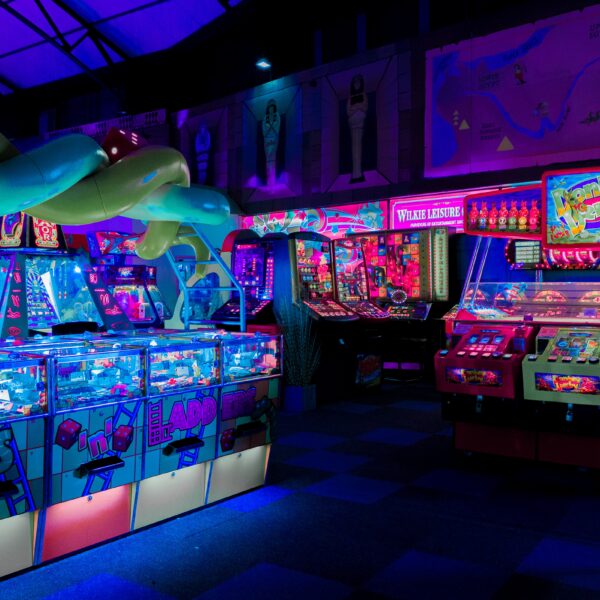“Exploring the World of Deck Building Games” offers a comprehensive overview of the captivating genre that has gained significant popularity among board game enthusiasts. These games revolve around the concept of players gradually enhancing their initial set of cards throughout gameplay, starting with a generic deck and strategically acquiring better cards from a shared card pool. Success in deck building games heavily relies on astute card choices and establishing synergies within a player’s deck, making it a thrilling and mentally stimulating experience. With an appeal rooted in discovering unique card combinations, these games attract avid strategists and those seeking an immersive gaming experience. However, it is important to note that setting up and dismantling decks may prove time-consuming for some players. Among the notable deck building games are Hero Realms, Dominion, Legendary: Marvel Deck Building Game, Thunderstone Quest, Aeon’s End, Dune Imperium, and Fort. With this exploration into the world of deck building games, readers will gain valuable insights into this engrossing genre and its potential to provide endless hours of entertainment.

What is a Deck Building Game?
Definition of deck building games
A deck building game is a type of card game where players start with a basic deck and gradually enhance it by acquiring better cards throughout the game. Unlike traditional card games where players have a fixed deck at the beginning, deck building games allow players to actively shape and improve their deck by purchasing or earning new cards.
How deck building games work
Deck building games follow a common gameplay structure. At the beginning of the game, each player starts with a set of predetermined cards in their deck. These cards typically consist of basic and weaker cards that provide a foundation for their strategies. As the game progresses, players will have the opportunity to acquire better cards from a central card pool.
During their turn, players use the cards in their hand to perform specific actions, such as gaining resources, attacking opponents, or acquiring new cards. The objective is to optimize their deck by strategically choosing cards that complement their overall strategy and provide powerful synergies.
Components of a deck building game
Deck building games usually include several components that are essential to the gameplay experience. These components typically include:
-
Card decks: Each player starts with a deck of cards, usually consisting of basic cards with limited abilities.
-
Central card pool: This is a shared pool of cards available to all players. It contains a variety of cards that players can acquire to improve their decks.
-
Resource tokens: Some deck building games use resource tokens to represent currency or other valuable resources that players can spend to acquire new cards.
-
Player boards or mats: These provide a designated area for players to organize their cards and track their progress during the game.
-
Rulebook: This contains the instructions and rules for playing the deck building game, including any specific rules or mechanics unique to that game.
Strategies in Deck Building Games
Importance of strategic card choices
In deck building games, strategic card choices play a crucial role in determining a player’s success. Each card in a player’s deck has its own unique abilities and functions, and players must consider how each card interacts with the others in their deck. They need to assess their current deck’s strengths and weaknesses and make intentional card decisions to enhance their overall strategy.
For example, players may choose to focus on acquiring cards that generate more resources to increase their purchasing power, or they may prioritize cards that deal damage to opponents to gain a competitive advantage. The strategic choices made during the game can greatly impact the effectiveness and efficiency of a player’s deck.
Building card synergies
Creating card synergies is another key aspect of strategy in deck building games. Synergy refers to the way cards interact with each other to create powerful combinations or effects that benefit the player. By acquiring cards that work well together, players can maximize the potential of their deck.
For instance, a player might choose to acquire cards that allow them to draw additional cards, while also adding cards that benefit from having a larger hand size. This synergy creates a loop where the player can continually draw and play more cards, increasing their overall productivity and options.
Maximizing your deck’s efficiency
Efficiency is a crucial element in deck building games. Players must strive to optimize their deck by maximizing the value and effectiveness of each card. This involves managing card ratios and ensuring a proper balance between different types of cards.
Players may choose to thin their deck by removing weaker and less impactful cards to increase the chances of drawing more powerful cards. They may also focus on cycling through their deck quickly to access their key cards more frequently. By fine-tuning their deck and making it more efficient, players can increase their chances of executing their game plan and achieving victory.

Appeal of Deck Building Games
Enjoyment of discovering card combinations
One of the main appeals of deck building games is the joy of discovering unique card combinations and interactions. As players acquire new cards and experiment with different strategies, they often stumble upon unexpected synergies or clever combinations that enhance their gameplay experience. This element of exploration and discovery keeps the game engaging and encourages players to continue experimenting with various card combinations.
Variety and replayability
Deck building games offer a high level of variety and replayability. With a central card pool containing numerous different cards, each game presents players with a different set of choices and possibilities. Players can explore different strategies, experiment with different card combinations, and uncover new tactics with each playthrough.
Additionally, many deck building games offer expansions or additional sets of cards that further enhance the variety and replayability. These expansions introduce new cards and mechanics, allowing players to continuously refresh and expand their gameplay experience.
Satisfaction of improving your deck
A major draw of deck building games is the satisfaction of gradually improving and customizing your deck. As players progress through the game, they have the opportunity to acquire more powerful cards and upgrade their deck’s overall strength. This sense of progression and growth adds an extra layer of motivation and fulfillment for players. The ability to see the direct impact of their strategic choices and witness their deck evolve over time can be highly rewarding.
Popular Deck Building Games
Hero Realms
Hero Realms is a deck building game set in a fantasy world where players take on the roles of heroes battling against each other. Players start with a basic deck and aim to eliminate their opponents by attacking them with their cards. The game offers various character classes, each with their own unique abilities, allowing for diverse gameplay experiences.
Dominion
Considered one of the pioneers of deck building games, Dominion involves players competing to build a kingdom. Players start with a small deck of basic cards and use them to obtain more valuable cards from the central card pool. With a vast variety of cards and expansions available, Dominion offers endless possibilities for different strategies and gameplay combinations.
Legendary: Marvel Deck Building Game
Legendary: Marvel Deck Building Game brings the Marvel universe to the deck building genre. Players assemble a team of superheroes to fight against powerful villains. The game combines cooperative and competitive elements, allowing players to work together to defeat the villains while also competing to earn the most victory points.
Thunderstone Quest
Thunderstone Quest combines deck building with dungeon crawling. Players form a party of adventurers and venture into dangerous dungeons in search of valuable Thunderstones. As they defeat monsters and gather treasures, players can upgrade their deck with more formidable cards to increase their chances of success in future quests.
Aeon’s End
In Aeon’s End, players take on the roles of mages defending their city against powerful nemesis. The game offers a cooperative experience where players work together to strategize and overcome the challenges. Aeon’s End introduces unique mechanics like a variable turn order and a persistent turn structure, providing a fresh twist to the deck building genre.
Dune Imperium
Dune Imperium combines deck building with strategic worker placement. Set in the Dune universe, players assume the roles of factions vying for control over the desert planet Arrakis. By acquiring cards and deploying agents, players aim to gain influence and outmaneuver their opponents.
Fort
Fort is a deck building game that takes inspiration from childhood experiences. Players are kids trying to build the best fort while attracting new friends to join their playgroup. By acquiring cards representing friends, pizza, toys, and more, players enhance their deck and compete to be the most popular kid in the neighborhood.

Setting Up and Tearing Down
Time-consuming nature of deck building games
Setting up and tearing down deck building games can be time-consuming, especially for games with a large number of cards or complex setups. The process typically involves sorting out the cards from the central card pool, distributing individual starting decks to players, and arranging any additional components or tokens required for gameplay.
To streamline the setup process, some players prefer to organize their cards in labeled dividers or use storage solutions that allow for easy sorting and retrieval of cards. This can significantly reduce the time spent on setup and make the overall gaming experience more efficient.
Organizing and storing game components
Organizing and storing deck building game components is essential for easy access and maintenance. As these games often come with numerous cards, having a system in place to keep them organized can save time and frustration.
Investing in card sleeves can help protect the cards from wear and tear, while also allowing for easier shuffling. Using storage solutions such as card boxes, deck boxes, or insert organizers designed specifically for deck building games can also help keep components neatly organized and readily available for future game sessions.
Tips for streamlining setup and teardown
Here are some tips to streamline the setup and teardown process for deck building games:
-
Sorting systems: Create a sorting system for the cards in the central card pool to make setup faster. This could involve sorting them by type, cost, or any other relevant category.
-
Pre-shuffling: Consider pre-shuffling the central card pool before the game starts to save time during setup.
-
Component organization: Use dividers or labeled compartments in storage solutions to keep individual cards and components separate and easily accessible.
-
Box organization: Arrange game components in an organized manner inside the game box, utilizing any built-in compartments or insert organizers. This will make it easier to set up the game and put it away after playing.
-
Streamlined storage solutions: Invest in storage solutions specifically designed for deck building games. These can include card boxes, deck boxes, or organizer inserts that neatly separate and store different sets of cards. This not only facilitates quicker setup but also ensures that everything stays organized between gameplay sessions.
Expansions and Customization
Expansion packs and additional cards
Many deck building games offer expansion packs that introduce new cards, mechanics, and gameplay elements. These expansions can provide more variety and replayability, as well as add depth to the existing gameplay experience. Expansion packs typically include new cards that can be mixed with the base game’s cards, allowing players to customize their decks further and explore new strategies.
Creating custom decks
Some deck building games allow players to create custom decks by selecting cards from a larger pool. This customization adds a layer of personalization and strategic decision-making to the game. Players can tailor their decks to their preferred playstyle, experiment with unique combinations, and showcase their creativity in building specialized decks that suit their strategies.
Custom deck creation may be done through draft formats, where players take turns selecting cards from a common pool, or through pre-constructed deck options that offer a variety of thematic or strategic focuses.
Balance and fairness in customization
Maintaining balance and fairness is essential when introducing customization options in deck building games. Game designers must ensure that the additional cards or custom deck options do not create an overwhelming advantage for certain strategies or render the base game irrelevant.
To maintain a balanced gameplay experience, expansion cards and customization options should be carefully playtested and balanced against the existing cards. Designers should strive to offer diversity and strategic options while also preventing any single strategy from dominating the game.
Deck Building vs. Collectible Card Games
Differences between deck building games and CCGs
Deck building games and collectible card games (CCGs) share some similarities but also have key differences in gameplay and mechanics. While both involve constructing decks and using cards strategically, the main distinction lies in how players acquire and expand their card collections.
In deck building games, players start with a fixed deck that gradually improves over the course of the game. They acquire new cards from a central card pool, with everyone having equal access to the available cards. Players are not required to purchase or collect additional cards outside of the game to enhance their decks.
On the other hand, CCGs involve players building their decks using cards they have collected or purchased outside of the game. These cards are typically obtained through buying booster packs or trading with other players. CCGs often prioritize deck customization and strategic card choices outside of actual gameplay, as players continually acquire new cards to improve their decks.
Advantages and disadvantages of each
The advantages of deck building games include:
-
Accessibility: Deck building games provide an equal starting point for all players, as everyone begins with the same set of basic cards. This makes them more accessible to newcomers and allows for a more balanced playing field.
-
Streamlined progression: Players can progressively enhance their decks throughout the game without needing to purchase additional cards. This eliminates the need for ongoing financial investment and allows players to focus solely on in-game decisions and strategies.
-
Variety and replayability: Deck building games often offer a wide range of cards and gameplay options, providing players with diverse strategies to explore. With expansions and customization options, the replayability of deck building games is significantly increased.
The advantages of CCGs include:
-
Collectible aspect: CCGs tap into the excitement of collecting and trading rare or valuable cards. The hunt for powerful or rare cards adds an additional layer of engagement and satisfaction for players who enjoy the collection aspect.
-
Continuous customization: CCGs provide ongoing opportunities for deck customization, as players can constantly update and modify their decks with new cards. This allows for a constantly evolving metagame and keeps the gameplay experience fresh.
-
Community and trading: CCGs often foster dedicated communities of players who trade and interact with one another. This social aspect of trading and discussing cards can enhance the overall enjoyment and engagement with the game.
The disadvantages of deck building games and CCGs include:
-
Initial investment: While deck building games do not require additional purchases for in-game progression, the initial purchase of the base game can still be a monetary investment. Similarly, CCGs can be expensive to initially acquire a competitive collection.
-
Limited customization options: Compared to CCGs, deck building games may have more limited customization options within the game itself. Players may find themselves restricted to the cards available in the central card pool and expansions.
-
Difficulty in balancing: Both deck building games and CCGs can face challenges in balancing the power level of cards and strategies. Designers must carefully consider the impact of each card on gameplay to ensure a fair and enjoyable experience for all players.
Audience preferences and gameplay styles
Ultimately, the choice between deck building games and CCGs often depends on individual preferences and gameplay styles. Some players may prefer the accessibility and equal starting point offered by deck building games, while others enjoy the collectible aspect and ongoing customization options provided by CCGs.
Deck building games can be particularly appealing to those who enjoy strategic decision-making within the game itself, as well as those who prefer a more level playing field without the need for external card acquisitions. CCGs, on the other hand, may attract players who relish the thrill of collecting, trading, and customizing decks outside of the actual gameplay.
Both genres have their own unique strengths and can provide immersive and enjoyable experiences for players. Ultimately, the choice comes down to personal preference and the desired gaming experience.
Deck Building Game Mechanics
Marketplace/central card pool
The marketplace or central card pool is a fundamental mechanic in deck building games. It consists of a selection of face-up cards that players can purchase or acquire to enhance their decks. The cards in the marketplace typically represent different abilities, resources, or actions that players can use to advance their strategies.
During their turns, players can spend resources or currency to obtain cards from the central card pool. The available cards may change as players acquire them, create openings for new cards to enter the market. The dynamic nature of the marketplace introduces an element of strategic decision-making, as players must assess and prioritize which cards to acquire based on their current resources and overall strategy.
Deck thinning
Deck thinning refers to the act of removing weaker or less useful cards from a player’s deck. In deck building games, acquiring powerful cards is often the key to victory. However, as players add new cards to their deck, it can become diluted, making it harder to draw the most effective cards consistently.
To mitigate this issue, players may employ deck thinning strategies to remove less impactful cards from their deck. By eliminating weaker cards, players increase the chances of drawing their stronger cards, improving the overall efficiency and effectiveness of their deck.
Deck thinning can be achieved through various means, such as playing cards that allow for the removal of specific cards, trading in cards for more desirable options, or using abilities that automatically discard or remove certain cards from the deck.
Deck cycling and reshuffling
Deck cycling is a mechanic that ensures continuous gameplay by allowing players to cycle through their entire deck multiple times. This mechanic ensures that players have access to all the cards in their deck, rather than becoming limited by the cards in their hand.
When a player’s deck is depleted, the discards are reshuffled to form a new deck. This allows players to draw new cards and continue playing without interruption. Deck cycling enables players to consistently use their most powerful cards or implement long-term strategies by ensuring that all acquired cards have an opportunity to come into play.
Hand management
Hand management is a crucial aspect of deck building games. Players must carefully decide which cards to play on their turn and which to keep in hand for future turns. Effective hand management involves considering the timing of card usage, maximizing card synergies, and balancing offense and defense.
Players may need to weigh the short-term benefits of playing a card immediately against the potential long-term advantage of saving it for a more opportune moment. They must assess the current game state, evaluate their opponents’ strategies, and make calculated decisions about which cards to prioritize in any given situation.
Skillful hand management allows players to adapt to changing circumstances, optimize their turns, and make the most out of their card combinations, ultimately increasing their chances of success.
Deck Building Game Variants
Cooperative deck building games
Cooperative deck building games introduce a collaborative element where players work together to achieve a common objective. Instead of competing directly against each other, players face challenges or enemies controlled by the game itself.
In cooperative deck building games, players pool their resources, strategize, and build their decks collectively to overcome obstacles or complete missions. The focus is on teamwork, communication, and coordinating card synergies to achieve victory as a group. These games often offer high player interaction and can provide a unique gameplay experience that fosters camaraderie and cooperation.
Competitive deck building games
Competitive deck building games pit players against each other in a direct competition to achieve specific victory conditions. In these games, players strive to outmaneuver their opponents, build more powerful decks, or accumulate more victory points.
Competitive deck building games feature player interaction, where players can directly interact with each other’s decks or engage in tactical decisions that impact opponents. The strategic choices become more focused on disrupting opponents’ strategies and finding ways to gain an advantage over them. These games can be highly strategic and offer intense and engaging gameplay experiences.
Legacy and campaign-style deck building games
Legacy and campaign-style deck building games offer progression and narrative elements, allowing players to evolve their decks and storylines over multiple gameplay sessions. These games introduce persistent changes to the game state, such as unlocking new cards, modifying existing ones, or altering the game board.
In legacy-style games, each playthrough affects the next one, with decisions made in one game session influencing future games. Campaign-style deck building games involve a series of connected scenarios or missions, where the outcome of each game impacts subsequent scenarios or unlocks new content.
These variants provide a unique and immersive experience that allows players to develop a deeper connection with their decks and the evolving narrative. They often offer surprises, branching storylines, and a sense of progression, keeping players engaged and invested in the game over an extended period.
Tips and Strategies for Beginners
Start with a basic deck
As a beginner, it’s recommended to start with a basic deck in deck building games. Basic decks usually consist of simpler and more straightforward cards that help establish a foundation for understanding the game’s mechanics.
Starting with a basic deck allows players to familiarize themselves with the core gameplay loop and gradually learn how different cards interact with each other. It provides a more manageable starting point and prevents overwhelming players with complex card abilities or strategies.
Focus on card synergy
When building your deck, focus on card synergies. Look for cards that work well together and create powerful combinations. Synergy can come in different forms, such as cards that enhance similar effects, cards that trigger off specific conditions, or cards that complement each other in terms of resource generation or card draw.
By prioritizing cards that synergize well, you can increase the overall efficiency and effectiveness of your deck. Combining cards that have complementary abilities or effects can create a snowball effect, allowing you to gain significant advantages over opponents or achieve your objectives more easily.
Balance offense and defense
Achieving a balance between offense and defense is crucial in deck building games. While focusing solely on powerful offensive cards may seem appealing, neglecting defensive capabilities can leave you vulnerable to opponents’ attacks.
Consider incorporating cards that allow you to defend against or mitigate opponents’ actions, ensuring that you can withstand attacks while building up your offensive capabilities. Balancing offense and defense provides a more well-rounded and adaptable deck, increasing your chances of success in different game situations.
Strive for a deck that can both withstand opponents’ strategies and efficiently execute your own game plan, ultimately giving you a competitive edge.
In conclusion, deck building games offer a unique and dynamic gameplay experience where players actively shape and optimize their decks throughout the game. Strategic card choices, building card synergies, and maximizing deck efficiency are key components of success in these games. The appeal lies in discovering card combinations, the variety and replayability offered, and the satisfaction of improving one’s deck. Popular deck building games include Hero Realms, Dominion, Legendary: Marvel Deck Building Game, Thunderstone Quest, Aeon’s End, Dune Imperium, and Fort. Setting up and tearing down deck building games can be time-consuming, but streamlining the process through organization and storage solutions can help. Expansions and customization options allow for further customization and diversity in gameplay. Understanding the differences between deck building games and CCGs, as well as the advantages and disadvantages of each, can assist players in choosing the right game for their preferences. Various mechanics, variants, and strategies exist within the deck building genre, providing endless possibilities and opportunities for players to explore. Beginners can start with a basic deck, focus on card synergies, and balance offense and defense to enhance their gameplay experience and increase their chances of success.








